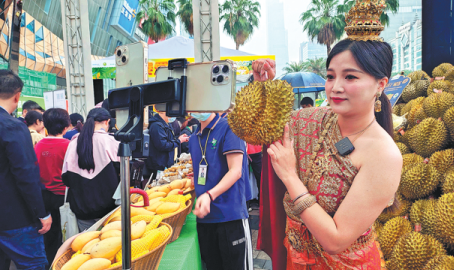Durian enjoys sweet smell of success with Chinese

A presenter livestreams a program about durian during a Thai fruit festival in Nanning, Guangxi Zhuang autonomous region, on Saturday. HUANG YANMEI/CHINA NEWS SERVICE
Durian, a fruit known for its strong odor and spiky shell, is becoming more and more popular in China, paving the way for its continued dominance over the country's imported fruit sector.
With the gradual implementation of the Regional Comprehensive Economic Partnership and the deepening of the China-ASEAN Free Trade Agreement, durian exports to China from Thailand are expected to see a major surge, according to Wanlada Ratanapanich, commercial consul with the Thai Consulate-General in Nanning, capital of Guangxi Zhuang autonomous region.
"China has huge potential as a fruit export destination. China's fruit imports from Thailand have continuously been on the rise," said Wanlada, while attending a Thai fruit festival that opened in Nanning on Saturday.
According to the Thai Ministry of Commerce, the value of fruit exports to China reached around $4.41 billion in 2022, with durian, mangosteen and longan among the most popular varieties.
Thailand's proximity to Guangxi has been a contributing factor for Thai fruits gaining easier access to the Chinese market.
In the first four months of 2023, foreign trade between Guangxi and Association of South East Asian Nations reached 104.91 billion yuan ($15.06 billion), a year-on-year increase of 123 percent. The autonomous region's trade with Vietnam and Thailand increased by 139 percent and 196.1 percent, respectively, according to local authorities.
Since durian prices have dropped considerably compared with the pandemic days, Chinese consumers are able to buy the fruit in larger quantities, Wanlada said.
Yu Huiyong, founder of Shenzhen Pagoda Industrial (Group) Corp, a leading fruit retailer based in Guangdong province, said the company had expanded its variety of fruit imports from Thailand in the past two decades.
The company, which operates more than 30 plants, processing and selling over 20 fruit varieties, has plans to acquire 630,000 metric tons of fruits from Thailand this year.
After Indonesia and Malaysia, China is the third-largest durian consumer in the world. With domestic production being limited, consumption of the tropical fruit largely relies on imports.
According to financial news out-let Yicai, durian dominated the imported fruits sector in 2022, with its value reaching $4.02 billion and volume increasing to 825,000 tons, nearly double compared with 2014.
Between 2015 and 2022, China's import of fresh durian has grown at the compound annual rate of 17 percent, according to data from the General Administration of Customs.
In January, the GAC issued permits for import of fresh durian products from the Philippines, and the quantity of durian products entering the Chinese market has been increasing since April.
Wang Jianjun, general manager of Shanghai Wonong Import &Export Co, told Yicai that durian has topped cherry in import volume, as the company imported about 40,000 containers of durian last year. "Durian consumers mostly belong to medium and high-income families in the cities," Wang added.
Domestic retailers and catering businesses have shown strong interest in durian products. Wumart Group, a leading retailer in Northern China, said the demand for fresh durian products has grown significantly since April, up 70 percent year-on-year, with most products being imported from northern Thailand.
"Livestreaming programs about durian has boosted sales," said Jason Yu, general manager of Kantar Worldpanel, a company that studies consumer behavior.
Zhang He, who runs a pizza chain in Beijing, said, "Customers love our durian pizza, and it contributes about 15 percent to our sales figures."














